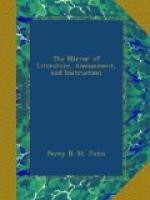It appears that the great wits of the age of Louis XIV. had not that contempt for cookery which some idealists of our days affect to have. Boileau has described a bad repast like a man who has often seen better; he liked the pleasures of the table, which have never been incompatible with the gifts of genius, or the investigations of the understanding. “I cannot conceive,” says Doctor Johnson, “the folly of those, who, when at table, think of every thing but eating; for my part, when I am there I think of nothing else; and whosoever does not trouble himself with this important affair at dinner, or supper, will do no good at any other time.” Boswell affirms that he never knew a man who dispatched a dinner better than the great moralist. But what avails it to defend cooks and gourmands? It is an axiom in political economy, according to Malthus, that he who makes two blades of grass grow, where before there was but one, ought to be considered as the benefactor of his country, and of mankind. Is not this a service which the epicure and the cook every day do their country? Addison thought differently from Johnson on this subject: “Every time,” says he, “that I see a splendid dinner, I fancy fever, gout, and dropsy, are lying in ambush for me, with the whole race of maladies which attack mankind: in my opinion an epicure is a fool.” What does this blustering of Addison prove? Boswell also asserts, that Addison often complained of indigestion. And in the present times, the first chemist of the day, Sir Humphry Davy, passes for a finished gourmand.
Roasting, boiling, frying, broiling, do not alone constitute the arc of cooking, otherwise the savage of the Oronoco might be maitre d’hotel with Prince Esterhazy.
The science of gastronomy made great progress under Louis XV., a brilliant epoch for the literature of gastronomy: together with the fashions, customs, freedom of opinion, and taste for equipages and horses brought from Great Britain—some new dishes taken from the culinary code of this country, such as puddings and beef-steaks, were also introduced into France. Thanks to the increasing progress and discoveries in chemistry, and to the genius of our artists, the art of cookery rose to the greatest height towards the end of the last century. What a famous age was that of Mezelier, l’Asne, Jouvent, Richaud, Chaud, and Robert.
History will never forget that great man, who aspired to all kinds of glory, and would have been, if he had wished, as great a cook as he was a statesman—I mean the Prince de Talleyrand, who rekindled the sacred flame in France. The first clouds of smoke, which announced the resurrection of the science of cookery in the capital, appeared from the kitchen of an ancient bishop.




